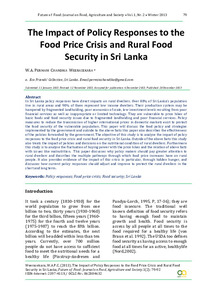| dc.date.accessioned | 2014-02-11T12:48:59Z | |
| dc.date.available | 2014-02-11T12:48:59Z | |
| dc.date.issued | 2013-12-20 | |
| dc.identifier.issn | 2197-411X | |
| dc.identifier.uri | urn:nbn:de:hebis:34-2014021145112 | |
| dc.identifier.uri | http://hdl.handle.net/123456789/2014021145112 | |
| dc.language.iso | eng | |
| dc.publisher | Department of Organic Food Quality and Food Culture at the University of Kassel, Germany and Federation of German Scientists (VDW) | eng |
| dc.rights | Urheberrechtlich geschützt | |
| dc.rights.uri | https://rightsstatements.org/page/InC/1.0/ | |
| dc.subject | Policy responses | eng |
| dc.subject | Food price crisis | eng |
| dc.subject | Food security | eng |
| dc.subject | Sri Lanka | eng |
| dc.subject.ddc | 630 | |
| dc.title | Impact on Policy Responses to Food Price Crisis and Rural Food Security in Sri Lanka | eng |
| dc.type | Aufsatz | |
| dcterms.abstract | In Sri Lanka policy responses have direct impacts on rural dwellers. Over 80% of Sri Lanka’s population live in rural areas and 90% of them represent low income dwellers. Their production system may be hampered by fragmented landholding, poor economics of scale, low investment levels resulting from poor financial services as well as inappropriate or limited technology. They are vulnerable to price hikes of basic foods and food security issues due to fragmented landholding and poor financial services. Policy measures to reduce the transmission of higher international prices in domestic markets exist to protect the food security of the vulnerable population. This paper will discuss the food policy and strategies implemented by the government and outside to the above facts this paper also describes the effectiveness of the policies forwarded by the government. The objective of this study is to analyse the impact of policy responses to the food price crisis and rural food security in Sri Lanka. Outside of the above facts this study also treats the impact of policies and decisions on the nutritional condition of rural dwellers. Furthermore this study is to analyse the fluctuation of buying power with the price hikes and the relation of above facts with issues like malnutrition. This paper discusses why policy makers should pay greater attention to rural dwellers and describes the multiple pathways through which food price increases have on rural people. It also provides evidence of the impact of this crisis in particular, through hidden hunger, and discusses how current policy responses should adjust and improve to protect the rural dwellers in the short and long term. | eng |
| dcterms.accessRights | open access | |
| dcterms.bibliographicCitation | In: Future of Food: Journal on Food, Agriculture and Society. Witzenhausen : University of Kassel, Department of Organic Food Quality and Food Culture. - Vol. 1, No. 2 (2013), S. 79-92 | |
| dcterms.creator | Weerasekara, W. A. Permani Chandika | |

